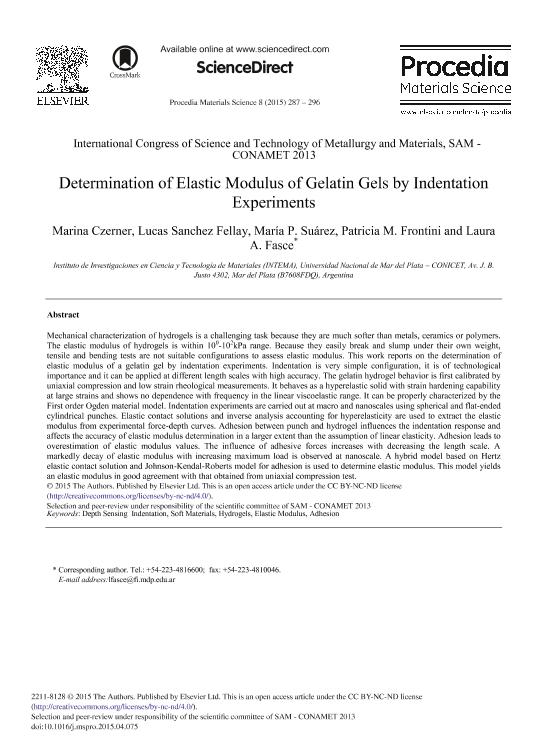Artículo
Determination of elastic modulus of gelatin gels by indentation experiments
Czerner, Marina ; Sanchez Fellay, Lucas
; Sanchez Fellay, Lucas ; Suarez, Maria Patricia
; Suarez, Maria Patricia ; Frontini, Patricia Maria
; Frontini, Patricia Maria ; Fasce, Laura Alejandra
; Fasce, Laura Alejandra
 ; Sanchez Fellay, Lucas
; Sanchez Fellay, Lucas ; Suarez, Maria Patricia
; Suarez, Maria Patricia ; Frontini, Patricia Maria
; Frontini, Patricia Maria ; Fasce, Laura Alejandra
; Fasce, Laura Alejandra
Fecha de publicación:
07/2015
Editorial:
Elsevier
Revista:
Procedia Materials Science
ISSN:
2211-8128
Idioma:
Inglés
Tipo de recurso:
Artículo publicado
Clasificación temática:
Resumen
Mechanical characterization of hydrogels is a challenging task because they are much softer than metals, ceramics or polymers.The elastic modulus of hydrogels is within 100 -102kPa range. Because they easily break and slump under their own weight,tensile and bending tests are not suitable configurations to assess elastic modulus. This work reports on the determination of elastic modulus of a gelatin gel by indentation experiments. Indentation is very simple configuration, it is of technological importance and it can be applied at different length scales with high accuracy. The gelatin hydrogel behavior is first calibrated byuniaxial compression and low strain rheological measurements. It behaves as a hyperelastic solid with strain hardening capabilityat large strains and shows no dependence with frequency in the linear viscoelastic range. It can be properly characterized by theFirst order Ogden material model. Indentation experiments are carried out at macro and nanoscales using spherical and flat-endedcylindrical punches. Elastic contact solutions and inverse analysis accounting for hyperelasticity are used to extract the elasticmodulus from experimental force-depth curves. Adhesion between punch and hydrogel influences the indentation response andaffects the accuracy of elastic modulus determination in a larger extent than the assumption of linear elasticity. Adhesion leads tooverestimation of elastic modulus values. The influence of adhesive forces increases with decreasing the length scale. A markedly decay of elastic modulus with increasing maximum load is observed at nanoscale. A hybrid model based on Hertz elastic contact solution and Johnson-Kendal-Roberts model for adhesion is used to determine elastic modulus. This model yieldsan elastic modulus in good agreement with that obtained from uniaxial compression test
Palabras clave:
Depth Sensing Indentation
,
Soft Materials
,
Hydrogels
,
Elastic Modulus
,
Adhesion
Archivos asociados
Licencia
Identificadores
Colecciones
Articulos(CCT - MAR DEL PLATA)
Articulos de CTRO.CIENTIFICO TECNOL.CONICET - MAR DEL PLATA
Articulos de CTRO.CIENTIFICO TECNOL.CONICET - MAR DEL PLATA
Articulos(INTEMA)
Articulos de INST.DE INV.EN CIENCIA Y TECNOL.MATERIALES (I)
Articulos de INST.DE INV.EN CIENCIA Y TECNOL.MATERIALES (I)
Citación
Czerner, Marina; Sanchez Fellay, Lucas; Suarez, Maria Patricia; Frontini, Patricia Maria; Fasce, Laura Alejandra; Determination of elastic modulus of gelatin gels by indentation experiments; Elsevier; Procedia Materials Science; 8; 7-2015; 287-296
Compartir
Altmétricas



